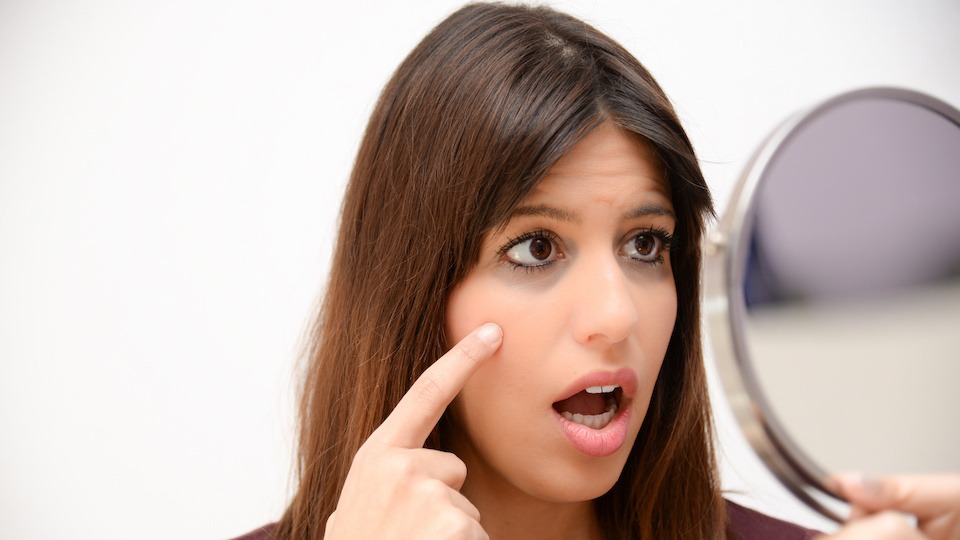Anyone who has ever pulled an all-nighter knows what to expect when they look in the mirror the next day. Dark, puffy circles under the eyes. Medical school is no exception and for many physicians, those dark circles under the eyes (we call it periorbital edema, infraorbital venous stasis, or infraorbital hyperpigmentation) are an occupational hazard. Nobody ever appreciates the classic joke: Those bags under your eyes could count as carry-on luggage at the airport. Not very funny…especially when it’s your eyes that are the butt of the joke.
Thankfully, dark circles are almost always from a benign and reversible condition. But many of my patients (many of whom pull all-nighters too) are curious about what causes them, if they are symptomatic of something serious, and what can be done about them cosmetically? Here are some things you need to know.
Should you be concerned by dark circles under your eyes?
Dark circles under the eyes are an exceedingly common condition, but in the vast majority of cases, they are not an indication of a serious medical problem. As you’d probably expect, fatigue and lack of adequate rest can precipitate or exacerbate that “raccoon-eyed” look, but those dark shadows often have less to do with tiredness than factors like skin thickness.
The periorbital skin (the skin around your eyes) is just 0.5 mm thick, which makes it a lot more transparent than dermis anywhere else (which is usually 2.0 mm thick). The means that it’s a lot easier to see the veins, blood vessels, and capillaries just beneath the surface.
When you are looking through a thin layer of skin at blood vessels underneath, those vessels look different than they would without the layer of skin on top. That’s because the skin only allows light of certain wavelengths to pass through. In individuals with lighter skin, only light from the blue/violet spectrum can reach below the dermis, which explains the bluish dark tinge people see reflected back. Those with darker skin will have veins that appear green or brown.
What causes the dark circles?
There are several factors that can cause the blood vessels and the darkish colorations to appear more pronounced:
- As people age, the skin loses its elasticity while becoming thinner. This makes the blood vessels even more visible.
- When you’re exhausted after a poor night sleep but still trying to function the next day, you will produce high levels of the stress hormone cortisol in an attempt to keep yourself awake. Cortisol increases blood volume and causes blood vessels to dilate, which makes them more prominent and therefore more visible.
- Oxidative stress (caused by smoking or poor nutrition) can sometimes cause blood vessels to leak or rupture. This puffiness and discoloration around the eyes are usually not serious in itself, but it could be an invitation to consider lifestyle changes.
Hyperpigmentation is another factor that can cause discoloration around the eyes. This involves an excess production of the pigment melanin, which is responsible for the darkened color associated with a tan. Once again, this is not a cause for concern medically, though many people do look for topicals to cover up the condition a cosmetically.
Takeaway
Although dark circles under the eyes are not something you should not lose sleep over, they may be telling you something:
- Are you getting adequate rest and high-quality sleep, which can help you alleviate chronic stress?
- Are you eating a mostly plant-based diet with nutrient-rich fruits & veggies and fiber-rich whole grains? Minimally processed whole foods are loaded with phytonutrients and free radical scavengers, which will help your body repair itself while mitigating the effects of oxidative stress.
- Are you getting enough exercise, which can help counteract the stress hormone cortisol?
Other factors that can impact puffiness and discoloration around the eyes include allergies, fluid retention, and excessive salt consumption. Once again, people can spend a lot of time and money trying to cover up the consequences of these conditions cosmetically. But the best way to address baggy eyes is the same far-sighted approach you take with your health in general — eat right, make sure to exercise, and get to sleep.
-The UpWellness Team









